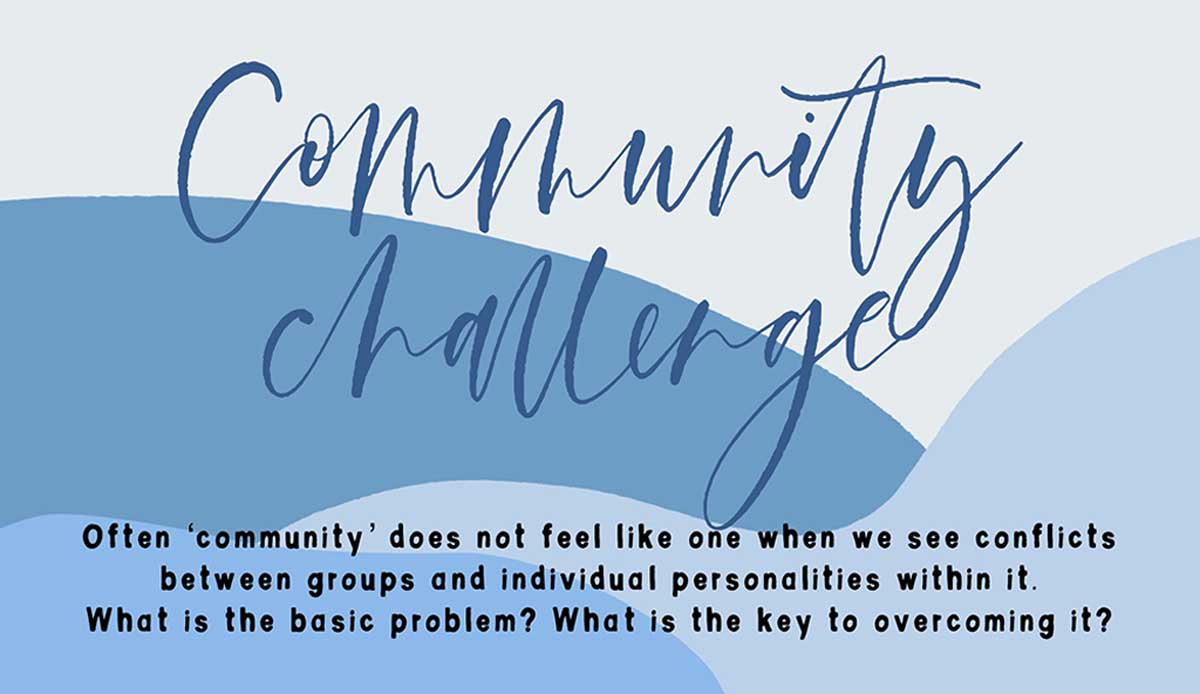Everi Yeo shares her notes and personal reflections from the second part of a series of talks by BE Dr Wee Boon Hup.
Self-serving individualism is the key threat to an authentic community
BE Dr Wee dived straight into the key threat to building an authentic community. In Genesis, we see that when Adam and Eve sinned, they played the blame game and sought to protect their own interests. As a result, the community between the two was broken; they were separated from one another.
“The woman whom you gave to be with me, she gave me fruit of the tree, and I ate.” Then the LORD God said to the woman, “What is this that you have done?” The woman said, “The serpent deceived me, and I ate.” Genesis 3:12-13 (ESV)
Truth be told, the blame game happens so easily in our daily lives.
Personally, I tend to place my own interests before that of others in situations where I feel vulnerable and in need of a self-built safety net.
In a truly authentic community made up of members that place the needs of others before their own, there would be no reason to feel this way. I imagine there would be a mutual sense of trust between members, for they are confident that their needs will be seen and met. Now that is beautiful.
As members of a community, it is important that we do not fall into the trap of believing that we are wise enough to decide that it is better to serve our own interests before that of others, for it fractures the community.
To love like God means making sacrifices
How do we overcome this ‘countervailing’, or opposing force? The answer lies in Jesus, who gave His life for our sins without regard for His status as God’s son. He is our model and motivation for authentic community!
Here it is in a nutshell: Just as one person did it wrong and got us in all this trouble with sin and death, another person did it right and got us out of it. But more than just getting us out of trouble, he got us into life! One man said no to God and put many people in the wrong; one man said yes to God and put many in the right. (Romans 5:18-19, MSG)
But denial of self (not material things), and dying to the cross daily is what it takes. Jesus said, “If anyone would come after me, let him deny himself and take up his cross daily and follow me. For whoever would save his life will lose it, but whoever loses his life for my sake will save it. (Luke 9:23-24, ESV)
And of course, the words of one my favourite childhood praise song reminds me as well: I have been crucified with Christ. It is no longer I who live, but Christ who lives in me. And the life I now live in the flesh I live by faith in the Son of God, who loved me and gave himself for me. (Galatians 2:20, ESV)
But don’t we need to strike a balance between being inclusive of new entrants to our community and building a safe space for existing members?
“Authentic community must be open at all times,” said BE Wee. “We are [brought] to a different level when somebody else comes in, changes the whole dynamic of what the group is, and makes us better than we cannot be if they had not come to join us.”
As existing members, we should be willing to give up the intimacy and familiarity within the community that we might feel entitled to. That is not an easy thing to do, and it’s not an overnight process (phew).
BE Wee’s words helped me to understand a vitally important truth: Although being an open community brings discomfort in the initial stages, we ultimately gain far more than we lose!
Submission is the outward expression of inward humility
BE Wee’s final point was about submission.
Submit to one another out of reverence for Christ. – Ephesians 5:21 (NIV)
Healthy community living requires its members to have an attitude of submission. This can only be cultivated in those who have truly drawn near to Christ, for they will desire to honour Him and be more like Him in this way.
In other words, we need to do the hard work of getting along with each other.
In order for it to be a sustainable action, we need to honestly assess what our motivations are. Do we try to get along because it’s the social norm, to preserve peace, or because it is politically correct? We should submit only because we want to honour Christ, and accept that there will be inconveniences as a result.
It sounds cliched but it’s true: We need to be willing to say ‘yes’ rather than go with our first instincts of saying ‘no’ to others. Let’s learn put aside our pride, and our sense of entitlement, so that we can have open hearts.


